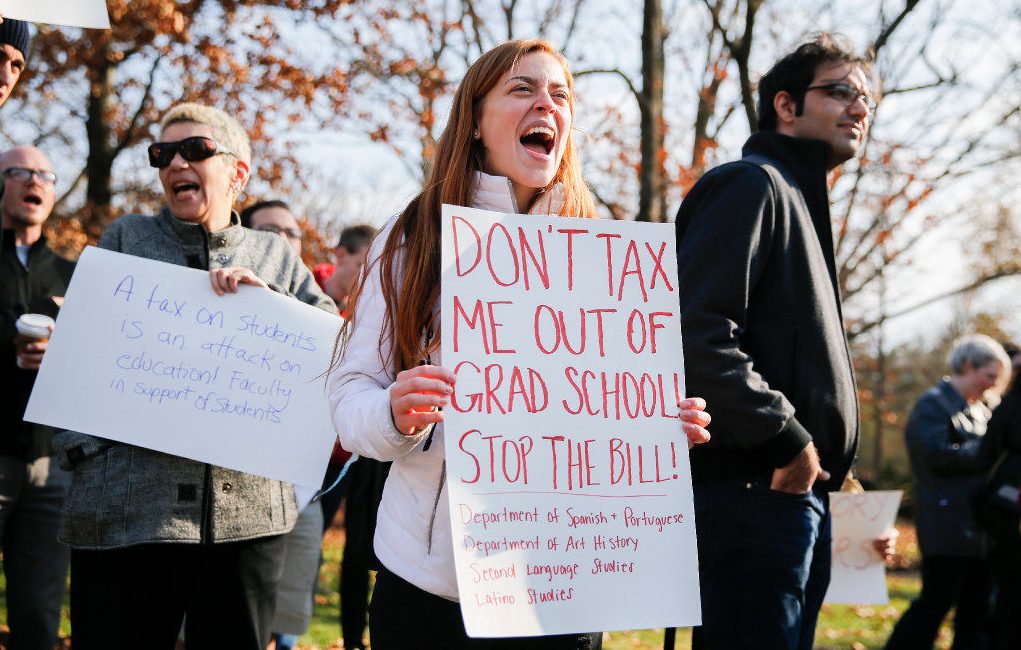If the Republican tuition tax bill goes into effect, my taxes could triple. I am not one of Trump’s billionaire friends, who he says are “not so happy with [him]”, though I echo their sentiments. I am a grad student, and right now I make around 35 thousand dollars per year. This generous stipend allows me to pursue my Ph.D. in molecular biophysics and biochemistry studying immune factors that fight HIV infection. But if my taxes were to increase to over 10 thousand dollars, I might have trouble finishing my degree.
The tax bill that passed the House of Representatives before Thanksgiving had a number of provisions that will increase the cost of higher education, and particularly of graduate school. These provisions are a dangerously short-sighted way to raise relatively little revenue, given that an educated workforce is crucial to sustaining a healthy economy. The bill repeals the student loan interest deduction, eliminates the Lifetime Learning Credit, imposes a tax on endowment returns at wealthy private universities, and repeals Section 117(d) of the U.S. tax code, which classifies tuition reductions, or discounts, as non-taxable income. Without Section 117(d), I will be taxed on my tuition as well as my stipend, and my yearly income could increase from 35 thousand dollars to 75 thousand dollars in the eyes of the IRS even though the amount on each of my paychecks would stay the same.
This proposal has graduate students like me worried. Last week, we rallied, and those of us at Yale lit up the phones in Washington. If this tuition tax becomes law, those of us who have already started our degree are faced with a tough choice: leave grad school without a degree after years of work, or continue while taking on extra jobs and facing additional debt. Most of these provisions are absent from the bill that passed the Senate last week, though now they are up for debate in the conference committee. Now is not the time to be silent: the next few weeks could determine the fate of higher education in our country.
The decision to pursue graduate school is driven by a passion to learn. Attending graduate school is not financially lucrative, but it remains possible thanks to tuition waivers, health insurance, and stipends provided by graduate programs. But if the tuition tax becomes law, younger students considering a graduate degree may decide that they can no longer afford it. Especially with Bachelor’s degrees from STEM programs, students could easily find other jobs as technicians in pharmaceutical firms or entry-level workers in tech companies. America must keep graduate school affordable in order to recruit promising students who will tackle our nation’s greatest challenges and create entirely new industries.
Long term, a decline in the number of students pursuing graduate degrees will have a real impact on our universities. Universities will lose the research and teaching assistants who are in training to become tomorrow’s professors and leaders of industry. Groundbreaking fundamental research conducted at universities, which fuels our economy, broadens our horizons, and contributes to America’s standing in the world, will dwindle without a steady influx of new and diverse minds with fresh perspectives.
There are certainly obstacles to higher education that face aspiring students today, and there are real concerns about the structure of the academic workforce in my field especially. These are problems that need solving, but a policy which makes independent wealth a prerequisite for pursuing an advanced degree is not the answer.
We must all speak out, because we cannot afford this tax bill. We cannot afford to move backward, limiting the pursuit of higher education to a privileged few. And we certainly cannot afford a policy that would undermine the strength and diversity of our most valuable asset: our highly skilled, innovative workforce. I will be calling my members of Congress, and I encourage everyone—students, teachers, parents, friends, and anyone who cares about the fate of higher education—to do the same.
Sarah Smaga is a Ph.D. Candidate in Molecular Biophysics and Biochemistry at Yale. She is also Co-president of Yale Science Diplomats. Sarah can be reached for comment at [email protected].

